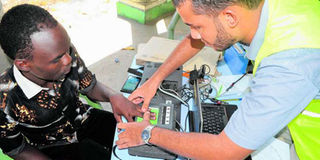Why electoral team wants to acquire new electronic machines

An Independent Electoral and Boundaries Commission clerk takes a person through the voter registration procedure at the Makadara grounds, Mombasa on February 16, 2016. The Independent Electoral and Boundaries Commission (IEBC) now says that failures of the Electronic Voter Identification (Evids) in 2013 coupled with the “logistical challenges in terms of the storage, transport and maintenance costs” make the 2013 kits unusable in the next election. PHOTO | KEVIN ODIT | NATION MEDIA GROUP
What you need to know:
- The Independent Electoral and Boundaries Commission (IEBC) now says that failures of the Electronic Voter Identification (Evids) in 2013 coupled with the “logistical challenges in terms of the storage, transport and maintenance costs” make the 2013 kits unusable in the next election.
- “The failure rate of the Evids functionality has demonstrated to the commission that it will be a high risk to use the same Evids in the 2017 General Election,” IEBC CEO Ezra Chiloba said.
- Furthermore, Mr Chiloba said, the commission intends to add more polling stations in 2017 to cater for new voters.
- IEBC will dispose of the 34,600 controversial gadgets used in the 2013 General Election and replace them with new version of Evids.
- A number of former and current IEBC commissioners and staff are facing investigations over the controversial purchase of the kits that failed to a large extent in 2013 and forced the identification of voters to be done manually.
The fixed battery life span of the electronic equipment used to identify voters in 2013 is not the only reason the electoral commission is seeking to replace them.
The Independent Electoral and Boundaries Commission (IEBC) now says that failures of the Electronic Voter Identification (Evids) in 2013 coupled with the “logistical challenges in terms of the storage, transport and maintenance costs” make the 2013 kits unusable in the next election.
“The failure rate of the Evids functionality has demonstrated to the commission that it will be a high risk to use the same Evids in the 2017 General Election,” IEBC CEO Ezra Chiloba said.
Furthermore, Mr Chiloba said, the commission intends to add more polling stations in 2017 to cater for new voters.
IEBC will dispose of the 34,600 controversial gadgets used in the 2013 General Election and replace them with new version of Evids.
A number of former and current IEBC commissioners and staff are facing investigations over the controversial purchase of the kits that failed to a large extent in 2013 and forced the identification of voters to be done manually.
The equipment were obtained from South Africa’s Face Technologies at the last minute and left little time to train commission staff on how to use them.
In 2013, each gadget cost Sh55,500 at the current exchange rate.
ELECTIONS OPERATIONS PLAN
The cost of acquiring the new kits, Mr Chiloba said, is part of the technology budget included in the Elections Operations Plan (EOP) and submitted to the National Treasury.
The EOP’s indicative budget as of November 15, 2015 for electoral technologies is about Sh4.5 billion, part of which formed the Sh500 million budget in 2015/16 for Mass Voter Registration and ICT.
“While it is true that the batteries have reached end of life, the fact that we have two different Evid gadgets (laptop and handhelds) has proven to be a logistical challenge in terms of the storage, transport and maintenance costs of the Evids,” Mr Chiloba said.
According to IEBC, the shelf life of the batteries under normal maintenance is three years, so all the batteries will have to be replaced if they do not buy new EVIDs.
“But there will be additional polling stations. Each polling station will have an Evid. Since the current ones were custom-made for the commission, there are high chances that acquiring additional kits may mean a different model all together. For consistency purposes, there is value to only have one model of Evid,” he added.
The new model, the commission explained, would have to take into account all the factors including the current cost of the gadgets, power management and retention, costs of maintenance, multi-functional capabilities, reliability, portability, sustainability and security.
“The 2013 General Election were the first time that Kenya fully adopted the use of ICT technology in elections. The commission has learnt valuable lessons and has a viable plan to address the challenges faced in 2013. The commission will ensure that the proposed new gadgets to either replace or upgrade the existing shall be designed based on these lessons as well as future sustainability and cost of maintenance,” the commission CEO said.




